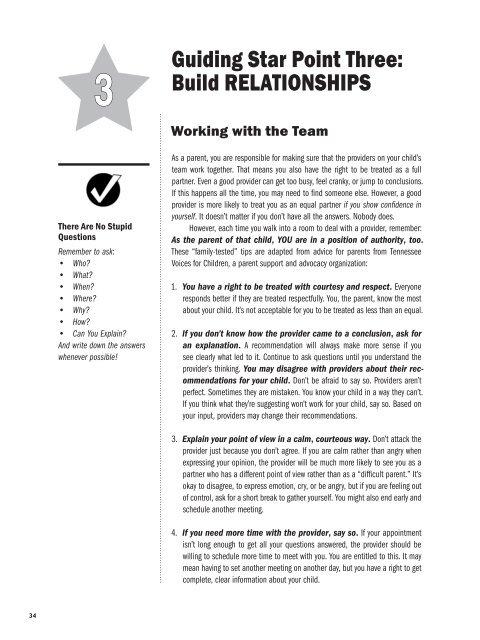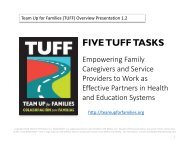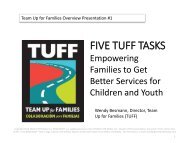Family Road Map Guide
Create successful ePaper yourself
Turn your PDF publications into a flip-book with our unique Google optimized e-Paper software.
3<br />
Guiding Star Point Three:<br />
Build RELATIONSHIPS<br />
Working with the Team<br />
There Are No Stupid<br />
Questions<br />
Remember to ask:<br />
• Who?<br />
• What?<br />
• When?<br />
• Where?<br />
• Why?<br />
• How?<br />
• Can You Explain?<br />
And write down the answers<br />
whenever possible!<br />
As a parent, you are responsible for making sure that the providers on your child’s<br />
team work together. That means you also have the right to be treated as a full<br />
partner. Even a good provider can get too busy, feel cranky, or jump to conclusions.<br />
If this happens all the time, you may need to find someone else. However, a good<br />
provider is more likely to treat you as an equal partner if you show confidence in<br />
yourself. It doesn’t matter if you don’t have all the answers. Nobody does.<br />
However, each time you walk into a room to deal with a provider, remember:<br />
As the parent of that child, YOU are in a position of authority, too.<br />
These “family-tested” tips are adapted from advice for parents from Tennessee<br />
Voices for Children, a parent support and advocacy organization:<br />
1. You have a right to be treated with courtesy and respect. Everyone<br />
responds better if they are treated respectfully. You, the parent, know the most<br />
about your child. It’s not acceptable for you to be treated as less than an equal.<br />
2. If you don’t know how the provider came to a conclusion, ask for<br />
an explanation. A recommendation will always make more sense if you<br />
see clearly what led to it. Continue to ask questions until you understand the<br />
provider’s thinking. You may disagree with providers about their recommendations<br />
for your child. Don’t be afraid to say so. Providers aren’t<br />
perfect. Sometimes they are mistaken. You know your child in a way they can’t.<br />
If you think what they’re suggesting won’t work for your child, say so. Based on<br />
your input, providers may change their recommendations.<br />
3. Explain your point of view in a calm, courteous way. Don’t attack the<br />
provider just because you don’t agree. If you are calm rather than angry when<br />
expressing your opinion, the provider will be much more likely to see you as a<br />
partner who has a different point of view rather than as a “difficult parent.” It’s<br />
okay to disagree, to express emotion, cry, or be angry, but if you are feeling out<br />
of control, ask for a short break to gather yourself. You might also end early and<br />
schedule another meeting.<br />
4. If you need more time with the provider, say so. If your appointment<br />
isn’t long enough to get all your questions answered, the provider should be<br />
willing to schedule more time to meet with you. You are entitled to this. It may<br />
mean having to set another meeting on another day, but you have a right to get<br />
complete, clear information about your child.<br />
34














